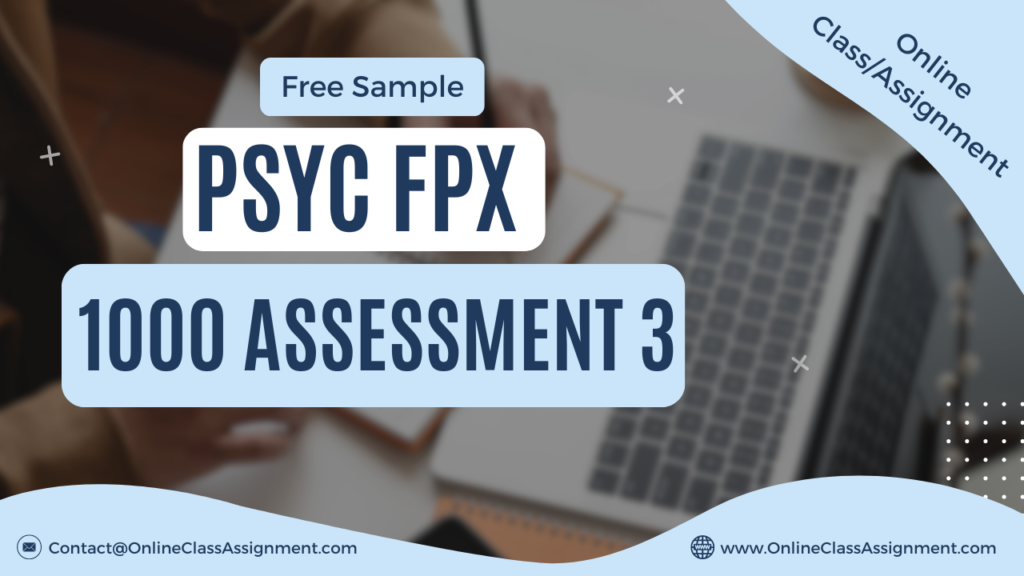
PSYC FPX 1000 Assessment 3 Applied Research in Psychology
Student Name
Capella University
PSYC FPX 1000 Introduction to Psychology
Prof. Name
Date
Applied Research in Psychology
Applied research in psychology involves scientific study and research aimed at resolving real-world issues through innovative approaches (Moreira et al., 2019). This paper focuses on researching ideas to support an anti-marijuana campaign targeted at teenagers. The utilization of applied research allows us to draw from the social cognitive theory of behavior, theory of planned behavior, and psychoanalytic theory to develop an effective awareness plan for marijuana prevention among teenagers (Carlini & Schauer, 2022).
Overview
Marijuana is a psychoactive drug derived from the cannabis plant. It is commonly used for recreational purposes and also finds application in various medical treatments. However, the prevalence of marijuana use among teenagers poses a serious problem, affecting their mental and physical well-being as well as their academic and career prospects. Studies indicate that approximately 9% of the U.S. population is addicted to marijuana, with 37% of school students having tried it and half of them becoming addicted to the drug. It is imperative to develop anti-marijuana campaign ideas to safeguard the mental and physical health of teenagers.
Proposed Solution to Marijuana Use Issue
The necessity for anti-marijuana campaigns arises from the alarming increase in marijuana use among teenagers. Studies reveal that teenagers often adopt substance use habits from societal influences, social media, and peers (Testai et al., 2022). The consequences of marijuana use can be detrimental, leading to lower intelligence, impaired concentration, risky sexual behaviors, and mental health issues such as depression, anxiety, and schizophrenia. To effectively address this issue, it is crucial to understand teenagers’ perspectives on marijuana use. Talking to marijuana-addicted teens can provide valuable insights into their beliefs and attitudes toward marijuana, enabling the creation of targeted anti-marijuana campaign ideas that resonate with them (Chiu et al., 2021).
Teenagers are particularly susceptible to drug abuse, including marijuana, due to various psychological factors such as peer pressure and unconscious desires (Ignaszewski, 2021). Therefore, psychological theories should be considered while devising anti-marijuana campaign ideas for teenagers.
Applying Theory to the Solution
The psychoanalytic theory, introduced by Sigmund Freud, investigates painful childhood experiences that shape behaviors based on conscious and unconscious events from early life. This theory encompasses elements of personality, such as id, ego, and superego. The id is driven by instinctive needs, prioritizing happiness while avoiding pain or sadness. The ego operates based on the principle of reality, while the superego is influenced by societal and environmental factors, shaping an individual’s thoughts and behavior (Oleksy, 2019).
Applying psychoanalytic theory to applied psychology, we can develop anti-marijuana campaign ideas:
- Highlight the distinction between recreational marijuana use and excessive use.
- Educate parents and teachers to keep marijuana-addicted teens away from non-addicted peers.
- Address underlying reasons for marijuana use, such as childhood experiences and lack of parental attention and love.
- Facilitate open discussion sessions with teens to understand their perceptions of marijuana use and provide corrective information about its harmful effects.
- Emphasize the negative impact of marijuana on mental health.
- Utilize social media platforms to disseminate the campaign to appeal to teenagers influenced by their social environment (superego element of personality).
Impact on Mental Health and Well-Being
Implementing an anti-marijuana campaign will positively impact teenagers as their minds are at a developmental stage, making them receptive to learning and behavior modification. Informing them about the negative effects of marijuana on their health and future prospects will encourage them to reconsider its use. Additionally, discussion sessions will allow teenagers to share their problems, promoting mental stability and reducing aggression. Consequently, teenagers will be better equipped to concentrate on their studies and lead happier lives. Furthermore, increased parental attention and support resulting from the campaign will contribute to a decline in marijuana use among teens.
Conclusion
Teenagers often adopt behaviors without fully comprehending the potential consequences. The prevalent belief among some teens that marijuana use for recreational purposes is harmless highlights the need for unique and targeted anti-marijuana campaign ideas. By incorporating psychological theories, such as the psychoanalytic theory, into applied research, we can develop effective campaigns to reduce marijuana use among teenagers and positively impact their mental and physical well-being.
References
Carlini, B. H., & Schauer, G. L. (2022). Cannabis-only use in the USA: prevalence, demographics, use patterns, and health indicators. Journal of Cannabis Research, 4(1). https://doi.org/10.1186/s42238-022-00143-y
Chiu, V., Leung, J., Hall, W., Stjepanović, D., & Degenhardt, L. (2021). Public health impacts to date of the legalisation of medical and recreational cannabis use in the USA. Neuropharmacology, 108610. https://doi.org/10.1016/j.neuropharm.2021.108610
Ignaszewski, M. J. (2021). The epidemiology of drug abuse. The Journal of Clinical Pharmacology, 61(S2). https://doi.org/10.1002/jcph.1937
Moreira, B. F. T., Pinto, T. S. S., Starling, D. S. V., & Jaeger, A. (2019). Retrieval practice in classroom settings: a review of applied research. Frontiers in Education, 4(5). https://doi.org/10.3389/feduc.2019.00005
PSYC FPX 1000 Assessment 3 Applied Research in Psychology
Oleksy, E. (2019). A brief review of Freudian and Jungian theories. The Downtown Review, 5(2). https://engagedscholarship.csuohio.edu/tdr/vol5/iss2/4/
Scholtz, S. E., de Klerk, W., & de Beer, L. T. (2020). The use of research methods in psychological research: a systematised review. Frontiers in Research Metrics and Analytics, 5(1). frontiersin. https://doi.org/10.3389/frma.2020.00001
Testai, F. D., Gorelick, P. B., Aparicio, H. J., Filbey, F. M., Gonzalez, R., Gottesman, R. F., Melis, M., Piano, M. R., Rubino, T., & Song, S. Y. (2022). Use of marijuana: effect on brain health: a scientific statement from the American heart association. Stroke, 53(4). https://doi.org/10.1161/str.0000000000000396
PSYC FPX 1000 Assessment 3 Applied Research in Psychology
Get Capella University Free BS Psychology Samples
BIO FPX 1000
COM FPX 1150
HIM FPX 4610
HIS FPX 1150
HUM FPX 1150
PSYC FPX 1000
PSYC FPX 2200
PSYC FPX 2300
